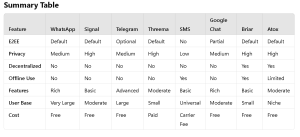Messaging App Comparison
Comparing Messaging Platforms: WhatsApp, Signal, Telegram, Threema, SMS, Google Chat, Briar, and Atox
In an increasingly connected world, messaging platforms have become essential for personal and professional communication. With numerous options available, it’s crucial to understand their features, privacy implications, and unique benefits. Here’s a detailed comparison of eight popular messaging services: WhatsApp, Signal, Telegram, Threema, SMS, Google Chat, Briar, and Atox.
1. WhatsApp
Overview:
Owned by Meta, WhatsApp is a global leader in messaging, offering features such as voice/video calls, file sharing, and group chats.
Pros:
End-to-end encryption (E2EE) by default for all chats.
Massive user base ensures wide accessibility.
Features like disappearing messages and business integration.
Cons:
Metadata is collected, raising privacy concerns.
Heavily linked to the Meta ecosystem.
Best For: Casual users looking for a feature-rich, widely used app.
Overview:
Signal is a non-profit, privacy-first messaging app. Its development is funded by grants and donations.
Pros:
E2EE by default.
Open-source, audited for security.
Minimal metadata collection.
Cons:
Limited customization and features compared to competitors.
Smaller user base.
Best For: Privacy-conscious individuals and advocates.
3. Telegram
Overview:
Telegram is a cloud-based app known for its speed, scalability, and feature-rich environment.
Pros:
Supports massive group chats and public channels.
Secret Chats offer E2EE.
Cross-platform synchronization and bots for automation.
Cons:
Default chats are not E2EE.
Metadata policies are less transparent.
Best For: Communities and groups needing advanced features.
4. Threema
Overview:
A premium app emphasizing privacy, Threema offers a robust messaging experience without requiring a phone number.
Pros:
E2EE for all chats.
No link to personal identifiers (email/phone optional).
Swiss jurisdiction with strong privacy laws.
Cons:
Paid app, limiting user base.
Lacks some advanced features like large groups or bots.
Best For: Professionals and users prioritizing security and anonymity.
5. SMS
Overview:
SMS (Short Message Service) is the oldest digital messaging format, dependent on cellular networks.
Pros:
Universally supported on all mobile phones.
No internet required.
Cons:
Lacks encryption, making it insecure.
Limited to text, no advanced multimedia or group features.
Best For: Basic communication where internet access is unavailable.
6. Google Chat
Overview:
Google Chat integrates tightly with Google Workspace, catering to businesses and collaborative teams.
Pros:
Seamless integration with Google services.
E2EE available for some chats.
Advanced collaborative tools.
Cons:
Privacy concerns tied to Google’s data ecosystem.
Requires Google account for usage.
Best For: Teams using Google Workspace for productivity.
7. Briar
Overview:
Briar focuses on decentralization and security, operating over Bluetooth, Wi-Fi, or Tor for true offline messaging.
Pros:
Fully decentralized and peer-to-peer.
Operates without internet in proximity.
Extremely resilient to censorship and surveillance.
Cons:
Limited to text-based communication.
Niche user base.
Best For: Activists, journalists, and users in high-surveillance areas.
8. Atox or Qtox
Overview:
Built on the decentralized Tox protocol, Atox offers P2P encrypted messaging and VoIP without relying on centralized servers.
Pros:
E2EE by default.
Decentralized network, resilient to server outages.
Supports multimedia and voice communication.
Cons:
Requires manual updates and troubleshooting.
Limited user base and documentation.
Best For: Tech-savvy users favouring decentralized, secure communication. Excellent for unmatched security for company internal communication even across borders and continents.
Conclusion
Choosing the right messenger depends on your priorities:
For privacy: Signal, Threema, or Briar are excellent choices.
For features and group dynamics: Telegram or WhatsApp shine.
For decentralized or offline communication: Briar and Atox stand out.
For universal reach: SMS remains unmatched.
Understanding these differences ensures you can pick the platform that aligns with your communication needs.
